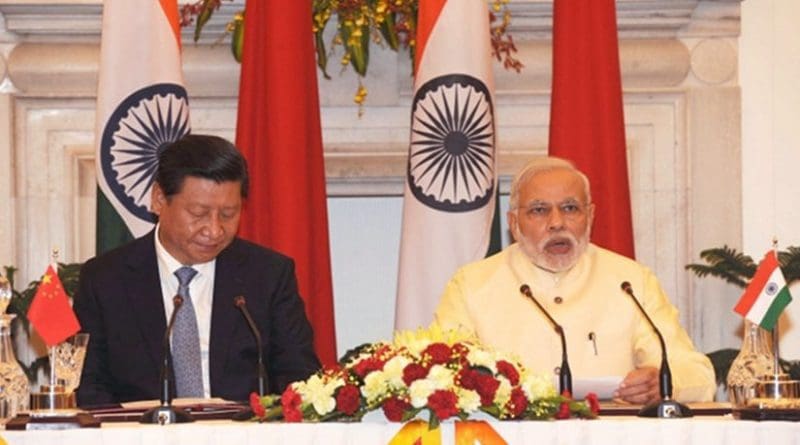Sino-Indian Strategic Dialogue: Differences In Strategic Thinking – Analysis
By IPCS
By Siwei Liu*
China and India reopened a new round of strategic dialogue in Beijing February. Admittedly, the dialogue has important implications for maintaining strategic stability in a changing regional security environment. But it has also revealed the differences in the two sides’ strategic mindsets. These differences feed into the trust deficit and will eventually weaken the dialogue process.
The Chinese Vice Foreign Minister Zhang Yesui and the Indian Foreign Secretary Subrahmanyam Jaishankar co-chaired the strategic dialogue held on 22 February 2017 in Beijing. During the seven hour-long talks, the two countries exchanged views on bilateral ties as well as regional and international issues of common concern. There is no denying that this was the right time for the two Asian giants to have such a comprehensive dialogue.
This was the first round of strategic dialogue held since the Indian Prime Minister Narendra Modi took office in 2014. Before this, the two sides had six rounds of dialogue from 2005 to 2014. Therefore, there is symbolic importance to the reopening of this dialogue for Sino-Indian relations as well. It demonstrates that both sides expect to see a more stable and healthy bilateral relationship.
Similarly, the practical significance of the strategic dialogue is also evident. Tthe new periphery strategies of both countries – China’s One Belt One Road (OBOR) initiative and India’s Indo-Pacific strategy – to some extent, have caused discomfort to each other. In addition, the new security dynamics in the Indo-Pacific region also bring some uncertainties and challenges to China-India strategic relations. It was important, therefore, for both countries to reopen dialogue and discuss how to avoid strategic misunderstanding.
The dialogue attracted considerable attention in various communities in the two countries, including the media. Unfortunately, it seemed that the dialogue was very hard to conduct from a practical point of view. In fact, some Indian analysts have started to complain about the results and expressed disappointment that the dialogue did not address a series of issues that have troubled Sino-Indian relations as they stand today. Similarly, Chinese experts argue that the two countries should use the mechanism to push forward greater strategic convergence rather than get entangled in strategic differences.
The difference in strategic mindsets played an important role in the conduct and results of this round of the Sino-Indian strategic dialogue. Both countries represent ‘oriental’ cultures; however, China and India “think differently.” China’s strategic mindset is more dialectical, synthetic, and also focused on long-term strategic planning. It is quite different from the Indian mindset, which is more abstract, exceptionalism-driven, and in favour of pursuing practical solutions at the tactical level. China and India bring their differing priorities shaped by these different styles of thinking or approaches to the negotiating table.
The Indian side preferred to bring up sensitive issues like India’s membership in the Nuclear Suppliers’ Group (NSG), getting the UN to impose sanctions on Jaish-e-Mohammed (JeM) chief Masood Azhar, among others. It appeared that India preferred to solve current problems and differences before pushing the bilateral strategic relations forward.
The Chinese prefer to understand bilateral ties though a big-picture analysis. Fu Ying, a Chinese diplomat, pointed out that, “the two sides should see trees, but also the forest.” Although Beijing was looking to narrow strategic differences through the dialogue, it also was inclined to discuss strategic convergence, including prospects of promoting regional cooperation. Beijing hoped to create a friendly atmosphere for bilateral ties. Contrary to Indian thinking, the Chinese are looking at establishing friendly bilateral relations before addressing specific issues between the two countries.
Admittedly, this is not the first strategic dialogue between China and India and both sides seemed to be highly attuned to each other’s way of thinking. Not just that – the maladjustment, to some extent, also made them uncomfortable. Delhi was obviously disappointed that China disregarded its demands on solving some sensitive issues. Although Beijing tried to address Indian concerns – for instance, a delegate who was an expert on nuclear issues had joined the dialogue on the Chinese side – the Chinese were not comfortable with the Indian over-emphasis on differences between the two sides rather than focusing on the convergences. Beijing does not want to allow these differences to cloud the overall relationship.
Perhaps it is necessary that the Chinese and Indian sides unstudy each other’s strategic mindset more closely. This also includes a better understanding of the other’s strategic culture. The conduct of the latest strategic dialogue has shown that a more open and creative attitude is the only way to have a successful Sino-Indian dialogue.
* Siwei Liu
Associate Researcher, Institution of South Asian Studies, Sichuan University, China


The article by Siwei Liu very aptly addressed the basic problem of Indo – Sino communication namely the difference regarding approaches to strategic thinking.
One would wish that politicians on both sides would properly take cognizance of this and start relativizing their respective starting points.
Fully agree with what Prof Siwei liu has stated. There is huge gap in the strategic thinking environment and goals of the two countries. What remains to be done is reduce the gap ,discuss the core interests of each other and try not to impose the core interests unilaterally.
Prof . Ashok Tiku
Head Chinese studies
Amity university Gurgaon ,India
[email protected]